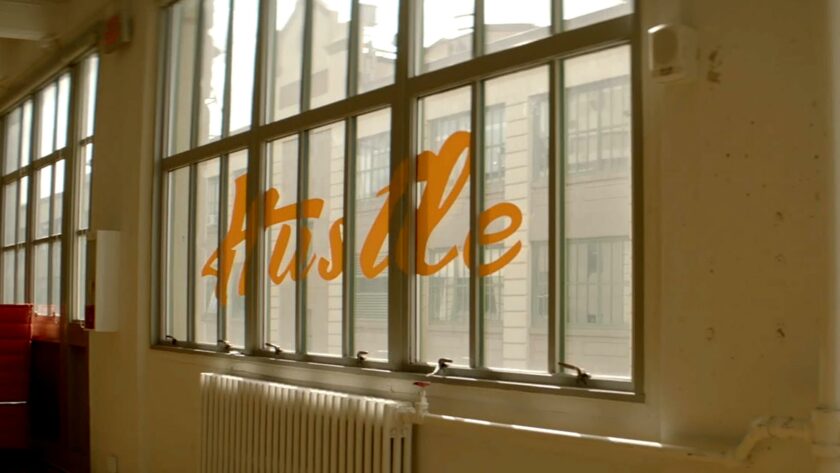The FilmSoc Blog is making their debut appearance at South by Southwest, a culture festival in Austin, Texas! In this first review, editor Lydia de Matos looks at a documentary on the rise and fall of co-working real estate company WeWork.
It seems an unstated fact that every modern entrepreneur wants to change the world. Better yet, they want to construct a new world in their image, somewhere they can be heralded as divine creator. This is their intention – not to simply create something helpful or enjoyable, to fill a gap in the market they spotted because they’ve actually worked in that market and know what’s needed – but to become a disruptor, a vanguard of the revolution. What revolution exactly? They’re not sure yet, they’ll get back to you next week. It might be an ‘ethical’ clothing brand, everything made entirely from natural fibres (by severely underpaid workers in an outsourced factory, oops), or a manufacturer that creates expensive electric cars, hoping to reduce global emissions (while keeping the labourers who build those cars on low wages and in poor health and safety conditions, oops). But maybe those ideas are too small. After all, we’re looking to change the world (and turn a profit) here, and when it comes to that, bigger is always better.
I did say every modern entrepreneur, but this pathology has been around for a while. The term comprehensive designer was coined in the sixties, and refers to the kind of person who exists as a ‘synthesis of artist, inventor, mechanic, objective economist, and evolutionary strategist;’ the kind of mythologised personality of great intelligence and foresight that a whole host of modern day entrepreneurs desperately wish to be. One such entrepreneur is – although perhaps I should say was – Adam Neumann, the founder of WeWork, and the subject of Jed Rothstein’s rather indulgently titled documentary WeWork: or the Making and Breaking of a $47 Billion Unicorn.
If you’ve heard about WeWork, you know where this is going. The company’s story is one of a head-spinning rise and spectacular crash, technically legal scams, obscene amounts of money, and a metric tonne of hubris. This is the story that Rothstein’s documentary attempts to tell, spinning multiple threads out from one central point: the deranged egotism and cultish personality of Adam Neumann. The documentary paints a convincing portrait of him as the root of WeWork’s most innate flaws, and it may well be right. Articles documenting the company’s downfall focus squarely on Neumann, devoting some space to the role of his wife Rebekah, and typically less than a sentence to co-founder Miguel McKelvey.
Visually, WeWork: or the Making and Breaking of a $47 Billion Unicorn (I promised myself I would only type out the full title once, but here we are) is pretty standard for a tell-all documentary. Talking heads cut with archival footage hardly makes for a stylistic film, and the overuse of stock footage veers the documentary into the realm of the bland. While that shouldn’t necessarily be a huge issue with this particular brand of documentary, it is disappointing.
I’ll admit that a part of me harbours a strange admiration for Neumann. Given the opportunity, I think I might also try to scam a horde of heavy-pocketed venture capitalists slavering over the prospect of enriching themselves on the backs of the next Uber or Amazon out of their money. Wouldn’t you? But what Rothstein makes clear is that Neumann may as well be one of those venture capitalists himself. Constantly he talks of making the world a better place, of community and creativity and invention, but – despite never stating it outright – Rothstein’s edit lets us see the sinister hollowness of his words. Neumann may well have wanted to change the world, but only out of a desire for a place in the history books and a lined pocket. After a point it becomes funny. What response could I possibly have to hearing the line “We are definitely not a real estate company, we are a community of creators” from the lips of a man whose business model was essentially: owning property, leasing it to his own company, and in turn sub-leasing it to office workers, other than laughter? If someone could point me toward proof that landlordism a) is revolutionary, b) makes the world a better place, or c) both of the above, maybe I could take the guy seriously, but for now I’m happy to find the humour in the situation.
Similarly disappointing is what I can only describe as a lack of narrative focus. Neumann is a chaotic guy, granted, but by telling the story of WeWork with him as its centrepoint, it seems that Rothstein’s film couldn’t help but take on some of that chaos. The result is a narrative throughline that at points feels blurry, lacking in the finer details. Threads are introduced then dropped, occasionally picked back up at a later point, but in the middle of a completely different thread. This isn’t a condemnation of the film, more just a forewarning. By the end, you’ll be left with a clear portrait of Neumann’s egotism and the cultish atmosphere he cultivated at WeWork, but fuzzy on some of the specifics of the story, and curiously googling for a decent explainer article to make sure you got it all.




